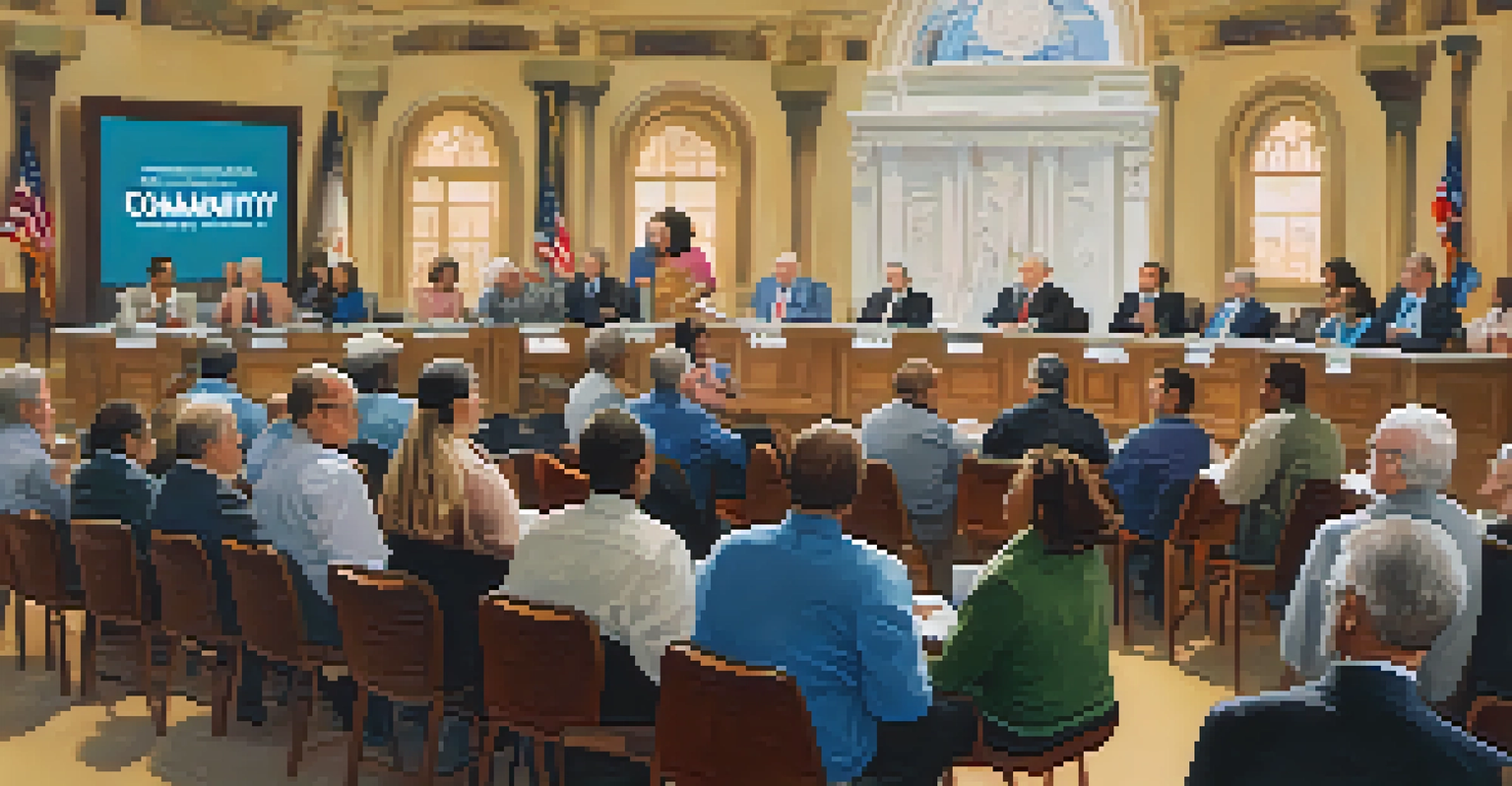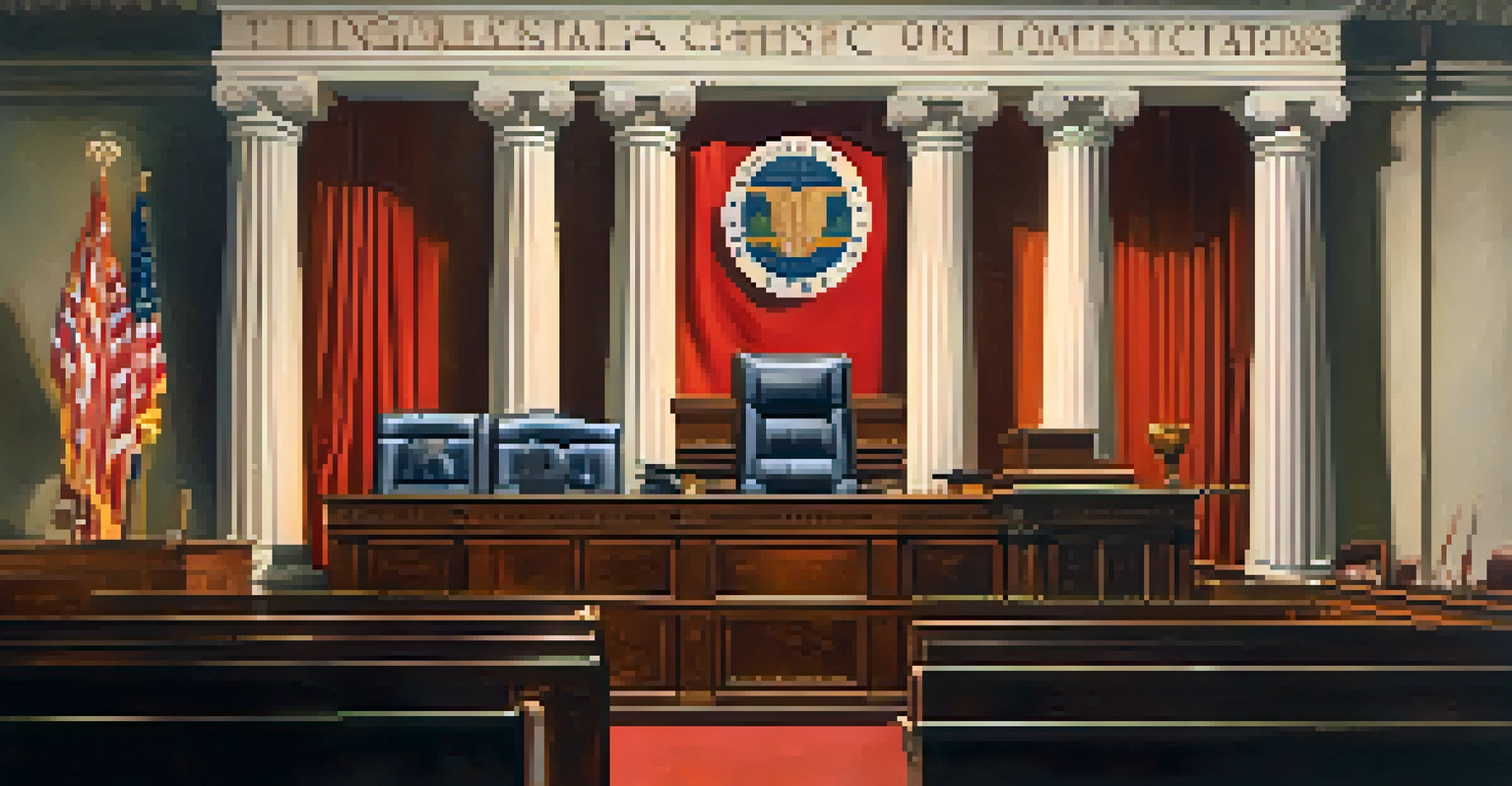Understanding the Legislative Process in Illinois State

Overview of the Illinois Legislative Process
The legislative process in Illinois is a structured journey that transforms ideas into laws. It involves several key players, including state legislators, the governor, and various committees. Understanding this process can help citizens engage more effectively in state governance and advocate for issues that matter to them.
The best way to predict the future is to create it.
At its core, the Illinois legislative process operates within a bicameral system, meaning it has two houses: the House of Representatives and the Senate. This structure ensures that proposed legislation is thoroughly examined from multiple perspectives before becoming law. Knowing this framework is crucial for grasping how policy decisions are made in the state.
Ultimately, the process is designed to ensure transparency and accountability. By understanding how laws are made, residents can better appreciate the importance of civic engagement and the impact of their voices in shaping state policies.
The Role of State Legislators in Illinois
State legislators in Illinois play a vital role in crafting and approving legislation. Each legislator represents a specific district, bringing the concerns and needs of their constituents to the table. This representation is essential for ensuring that diverse viewpoints are considered during the law-making process.

Legislators introduce bills, participate in debates, and vote on proposed legislation. Their work often involves collaborating with committees, where bills are analyzed and amended. This collaborative effort is crucial, as it helps refine legislation to better serve the public interest and address potential issues before a bill reaches the floor for a vote.
Illinois Legislative Process Overview
The legislative process in Illinois transforms ideas into laws through a structured journey involving key players like state legislators and the governor.
As the primary architects of state laws, legislators also serve as a bridge between the government and the public. They hold town hall meetings, engage with their communities, and gather feedback on pressing issues, reinforcing the democratic principle that the government should be responsive to the needs of its citizens.
The Process of Introducing Legislation
Introducing a bill in Illinois begins with an idea, often sparked by a problem or need within the community. Once a legislator decides to pursue this idea, they draft a bill and file it with the appropriate house of the legislature. This initial step sets the stage for the bill's journey through the legislative process.
Democracy is not a spectator sport.
After introduction, the bill is assigned to a committee that specializes in the relevant subject area. This committee conducts hearings, gathers testimony, and makes recommendations for amendments. This stage is crucial, as it allows for expert input and public opinion to shape the legislation before it potentially moves forward.
If the committee approves the bill, it will be scheduled for debate on the floor of the house. This discussion is an opportunity for legislators to express their views, propose additional changes, and ultimately decide whether the bill should proceed to the next stage in the process.
The Committee System in Illinois Legislature
The committee system is one of the cornerstones of the legislative process in Illinois. Committees are smaller groups of legislators who focus on specific areas, such as education, health, or transportation. This specialization allows for a more detailed examination of bills and helps ensure that legislation is well-crafted and informed.
Each bill typically goes through multiple committees, depending on its subject matter. Committees hold hearings where they can invite experts, stakeholders, and the public to provide input. This collaborative approach not only enhances the quality of legislation but also fosters transparency and public engagement in the decision-making process.
Role of Civic Engagement
Active civic engagement is essential for shaping legislation, as it allows citizens to voice their concerns and influence the legislative process.
Ultimately, the work done in committees can significantly influence the fate of a bill. A bill that passes through committee is more likely to be successful on the floor, while those that face challenges may be amended or even defeated. Understanding the committee system is essential for anyone interested in the legislative process in Illinois.
Debate and Voting in the Illinois Legislature
Once a bill clears the committee stage, it heads to the floor for debate. This is a critical moment where legislators can discuss the merits and drawbacks of the proposed legislation. Debates can be lively, with passionate arguments from both supporters and opponents, showcasing the democratic nature of the process.
During the debate, legislators may propose amendments to refine the bill further. This back-and-forth not only enhances the legislation but also allows for a broader range of opinions to be heard. After the debate concludes, a vote is taken, determining whether the bill will advance or be rejected.
If the bill passes in one house, it then moves to the other house, where it undergoes a similar process of committee review, debate, and voting. This bicameral requirement ensures that both houses have a say in the legislation, fostering a comprehensive examination of proposed laws before they reach the governor’s desk.
The Governor's Role in the Legislative Process
After a bill successfully passes both houses of the Illinois legislature, it is sent to the governor for approval. The governor plays a crucial role as the final gatekeeper of legislation, with the power to sign the bill into law or veto it. This authority underscores the checks and balances inherent in the legislative process.
If the governor approves the bill, it becomes law and is implemented throughout the state. However, if the governor vetoes the bill, they must provide a reason, and the legislature has the option to override the veto with a three-fifths majority vote in both houses. This process ensures that the governor's decisions can be challenged if there is significant legislative support for the bill.
Governor's Crucial Role
The governor acts as the final gatekeeper in the legislative process, with the power to sign bills into law or veto them, emphasizing checks and balances.
It's worth noting that governors can also issue amendments or suggest changes, providing a collaborative opportunity to refine legislation further. This interaction between the executive and legislative branches emphasizes the importance of cooperation and dialogue in effective governance.
The Importance of Civic Engagement in Legislation
Civic engagement is vital for a healthy legislative process in Illinois. When citizens participate actively—whether by contacting their legislators, attending public hearings, or voicing their opinions—they help shape the laws that govern their lives. This engagement fosters a sense of community and shared responsibility in the democratic process.
Moreover, legislators often rely on feedback from their constituents to understand the issues that matter most. Public input can influence the direction of proposed legislation, making it more responsive to the needs of the community. When citizens are vocal about their concerns, legislators are better equipped to advocate for meaningful change.

Ultimately, civic engagement enhances transparency and accountability in government. When people are informed and involved, they help ensure that the legislative process remains a true reflection of the community's values and priorities, leading to better governance for all.
Conclusion: Understanding the Legislative Process
Understanding the legislative process in Illinois empowers citizens to engage effectively in their government. From the roles of state legislators to the importance of civic participation, every aspect of the process plays a part in shaping laws that affect daily life. Knowledge is a powerful tool for advocacy and change.
As residents learn about how legislation is introduced, debated, and passed, they can better navigate their interactions with elected officials. This knowledge also fosters a culture of accountability, encouraging citizens to hold their representatives responsible for their actions.
In summary, the legislative process is a fascinating and essential component of governance in Illinois. By remaining informed and engaged, citizens can contribute to a thriving democracy and ensure their voices are heard in the halls of power.